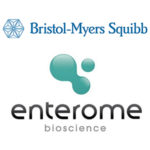 Bristol-Myers Squibb (NYSE:BMY) said today that it inked a collaboration agreement with Enterome to discover and develop microbiome-derived biomarkers and drug targets as potential companion diagnostics and therapeutics for cancer.
Bristol-Myers Squibb (NYSE:BMY) said today that it inked a collaboration agreement with Enterome to discover and develop microbiome-derived biomarkers and drug targets as potential companion diagnostics and therapeutics for cancer.
According to the agreement, Bristol-Myers Squibb will be given exclusive rights to intellectual property and therapies that result from the collaboration. Enterome will get an upfront payment of $15 million for its technology and funding for research and development. Enterome is eligible for preclinical and clinical milestone payments on each licensed therapy plus royalties on net sales, as well as additional milestone payments for new diagnostic products developed within the collaboration.
The collaboration will expand on Bristol-Myers Squibb’s growing immunotherapy portfolio using Enterome’s metagenomic technology platform. A growing body of scientific evidence suggests that the gut microbiome is a crucial part of modulating response and resistance to cancer immunotherapies. Because the gut microbiome drives changes within the host’s immune system, it can be used to identify specific targets and compounds that will contribute to anti-cancer immune responses.
“We continue to pursue the full potential of immuno-oncology by applying rapidly evolving science, technology and research to our strong foundation in harnessing the immune system to fight cancer,” Carl Decicco, head of discovery at Bristol-Myers Squibb, said in prepared remarks. “Business development has been integral in partnering external innovation with our internal R&D expertise and capabilities. Enterome’s focus on target identification and validation along with their significant experience in microbiome research can help to advance our goal to improve outcomes for patients treated with immunotherapies.”
“We are delighted to collaborate with Bristol-Myers Squibb to help advance the field of Immuno-Oncology,” Enterome CEO Pierre Belichard added. “The exciting combination of Bristol-Myers Squibb’s extensive capabilities in Immuno-Oncology with our expertise in identifying novel targets and molecules derived from the gut microbiome is highly complementary, and offers a unique opportunity to develop a new generation of cancer drugs and diagnostics.”
